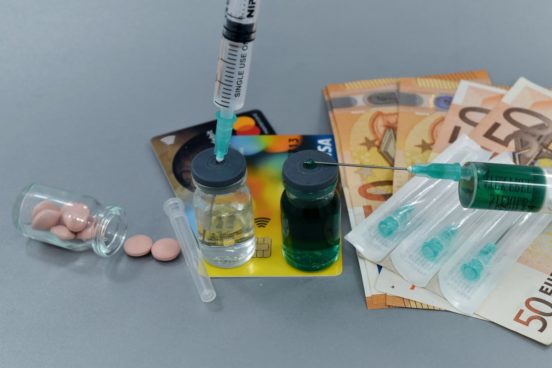The Innogen Institute is a collaboration between the University of Edinburgh and the Open University to produce research and support innovation in a profitable, safe and societally useful manner. It builds, nationally and internationally, on fundamental and applied research in science, medicine, engineering and social science. In April, the Innogen Institute discussed Professor Smita Srinivas’s co-authored article Economics and Public Health: a care for interdisciplinary cohesion in the time of coronavirus and the relevance of her work on the Covid-19 pandemic. Below is a summary of the interview by our COVID-19 Perspectives team.
Professor Srinivas’s research focuses on economics, with emphasis on economic development, technological innovation, and industrial policy. One aspect is big picture economics for policy with relevant changes in the discipline, the other is microeconomics to examine empirically how technological capabilities, learning, and innovation evolve, which generate more or less useful developmental outcomes. For the last 20 years in addition to other industries, she has researched how vaccines and pharmaceuticals, with more recent work on diagnostics, come into being and are regulated. Although the perspective comes from economics, this research spans public policy and public health. Professor Srinivas explains that analysing the firms in these sectors reveals useful features of what they look like, how they perform, what they research or invest in, and how the learning and innovations that these firms generate are aligned with public benefit or are rewarded. From an industry dynamics viewpoint, public health is an industrial organisation problem requiring greater attention; the economics underlying public health – as with much of economics – is out of date.
The economic discipline is, says Prof Srinivas, ‘deeply fractured’. This is affecting how we tackle several problems, including but not limited to: COVID-19, climate change, biodiversity, energy challenges, financial crashes, etc. She argues that students of economics today are not sufficiently taught the advances in domains such as evolutionary institutional analyses nor sufficient efforts made towards teaching a pluralist economics, which includes but is not limited to, what is termed ‘mainstream’ economics. Economists using a single or short list of methods are holding the discipline back, states Prof Srinivas, and ‘skewing public policy responses in a very alarming way’.
Currently Prof Srinivas is overseeing two projects in India one involving several Innogen members and led by the Open University: Innovations for Cancer Care in Africa examines how India, Tanzania, Kenya and the UK address different types of cancer to ask questions on economics methodology and a comparative policy viewpoint. The second project is a long-standing research area and recent collaboration with public health and clinical specialists examining vaccine development and its economic considerations. She is also writing on diagnostics and covid testing. In many countries, COVID-19 is a threat but so are other diseases which are vector borne or infectious, such as dengue, H1N1, and which with others, may generate inexplicable fevers. Patients may come in with several confounding symptoms, which make diagnosing COVID-19 cases difficult and sideline other disease priorities for the country. Furthermore, the Technological Change Lab (TCLab) has launched an integrative initiative of Health, Industry and Ecology (HIE) to examine the resilience of food-health systems in the current context as well as in post-COVID-19 plans; the global organisation of the health industry; and comparative development lessons in and from India and other industrialising countries about relative successes around planning and policy.
Prof Srinivas’s interest in these projects lies in the role of institutional change, including markets and their varieties, how they come to be and their regulation. Studying these factors is important in order to decide what policy responses should be and which non-market strategies to use. In the case of vaccine development, Prof Srinivas elaborates, market size and demand will determine if a private-sector led vaccine development initiative is reasonable, or which stakeholders should be involved. The seemingly infinite nature of the Covid-19 market and the frantic scrambling of companies to be the first, has left governments, donors and multilateral institutions overwhelmed and confused. Clarity on what types of markets are needed and why is essential, says Prof Srinivas, as are the instruments used. To this she points to the relevance of her 2006 publication on industrial procurement processes for vaccines that sped up learning at the level of firms, but which have reward and market design considerations for health impact. Attention to such policy instruments helps highlight the importance of a public stakeholder process built alongside industrial development: firms drawing on public resources or public data for example, might be required to create a different type of market. In any case, without taking the eye off public health outcomes, there are vital economic development considerations to be weighed, and the relevant economics that can best address this. Long-term economic strategies must be put into place for wider public benefit of technology transfer as well as private firm growth.
Summary by Ritti Soncco. Read the full interview on The Innogen Initiative website where the article was originally published: https://www.innogen.ac.uk/news/meet-our-researchers-prof-smita-srinivas
Prof Smita Srinivas is SGSS Professorial Research Fellow (Economics, Development) and Member of the Innogen Institute at The Open University (UK). In 2015 she received the EAEPE (European Association for Evolutionary Political Economy) Myrdal Prize for her book on the health industry “Market Menagerie: Health and Development in Late Industrial States” (Stanford University Press, 2012). She is the Founder Director of the Technological Change Lab (TCLab), a research platform, Visiting Professor at the National Centre for Biological Sciences (NCBS), TIFR, in Bengaluru, India, and Honorary Professor in the STEaPP department, University College London.
(https://pixnio.com/media/business-chemicals-chemistry-coronavirus-economic-growth)
(https://pixnio.com/media/business-chemicals-chemistry-coronavirus-economic-growth)










Comments by Ritti Soncco